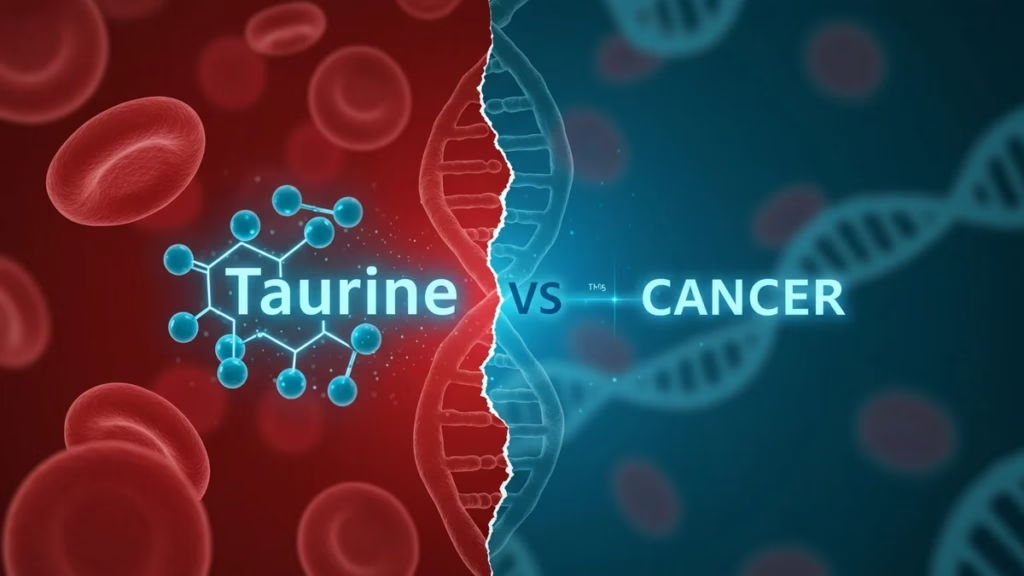Introduction
The term “taurine blood cancer” has sparked curiosity and concern worldwide. Taurine—a naturally occurring amino acid often added to energy drinks and supplements—has long been promoted for benefits like heart health, brain function, and metabolism. But a new scientific study has raised fresh questions: Is taurine linked to blood cancer? Does taurine cause blood cancer?
This article takes a deep dive into taurine, its role in the body, what the latest research reveals, and what this means for your health. We’ll also answer FAQs, review myths vs facts, and provide expert-backed insights for both healthy individuals and leukemia patients.
What Is Taurine?
Taurine is a sulfur-containing amino acid found in almost every tissue of the human body. While it’s not used to build proteins, it plays a crucial role in cellular function and metabolic health.
Key Functions of Taurine
- Maintains electrolyte balance inside cells
- Supports heart rhythm and blood pressure
- Aids in bile salt formation for digestion
- Contributes to nervous system stability
- Reduces oxidative stress and inflammation
Sources of Taurine
- Dietary sources: Meat, fish, and dairy products
- Supplements & energy drinks: Widely marketed for stamina, focus, and recovery
So far, taurine has been considered beneficial. But recent research suggests its role may not always be protective—especially when it comes to blood cancer.
Taurine and Blood Cancer: The Research
In 2025, a Nature study made global headlines after showing that taurine might fuel blood cancer progression. Researchers examined how leukemia cells use nutrients and found taurine playing a surprising role.
Main Findings
- Leukemia cells consume taurine aggressively: These cells use taurine as a fuel source for rapid growth.
- Blocking taurine slowed progression: When taurine uptake was inhibited, leukemia growth slowed significantly.
- No evidence taurine causes cancer: Importantly, taurine did not initiate blood cancer; it only supported progression once leukemia was already present.
Expert Insights
Health.com explained it clearly: taurine isn’t creating cancer, but in leukemia patients, cancer cells “hijack” taurine for energy (source).
This means taurine is linked to blood cancer progression, but it’s not the cause of the disease itself.
Does Taurine Cause Blood Cancer?
The big question: Does taurine cause blood cancer?
The answer is no. There’s no scientific evidence that taurine causes cancer in healthy individuals. Instead, leukemia cells seem to exploit taurine that’s already present in the body.
For more health-related insights, check out BlogAdviser365.
Important Clarifications
- Taurine is essential for normal health.
- Leukemia cells misuse taurine to fuel growth.
- Healthy people consuming taurine through food are not at risk of developing blood cancer from taurine.
In short: taurine does not cause blood cancer, but it can play a role in worsening the condition in patients who already have leukemia.
Taurine Linked to Blood Cancer: Why It Matters
When headlines say “taurine linked to blood cancer,” they mean:
- Leukemia cells depend on taurine metabolism for survival.
- Blocking taurine uptake could become a new cancer therapy strategy.
- It raises questions about taurine supplements and energy drinks in cancer patients.
For the general population, taurine remains safe. For patients with leukemia, it may be a factor that doctors will soon evaluate more closely.
Taurine and Blood Cancer: Benefits vs Risks
To make it clear, here’s a table summary:
| Aspect | Benefit of Taurine | Risk in Blood Cancer |
|---|---|---|
| Heart health | Supports heart rhythm, lowers blood pressure | Cancer cells may use taurine to survive |
| Metabolism | Improves fat digestion and energy balance | Fuels leukemia progression |
| Brain support | Stabilizes neurotransmitters | No direct brain cancer link |
| Supplements | Helps in stress recovery, sports endurance | May worsen leukemia growth if present |
This table shows why taurine is not inherently harmful, but in cancer biology, context matters.
Implications for Consumers
Healthy People
- Taurine in food or moderate supplements is safe.
- There’s no need to avoid taurine-rich diets.
Leukemia Patients
- High taurine intake through supplements or energy drinks may not be advisable.
- Always consult an oncologist before using taurine-containing products.
Energy Drink Users
- Risks often come from caffeine and sugar, not taurine itself.
- Still, moderation is key for overall health.
The Future of Research
The study has opened a new field in cancer research:
- Targeted therapy: Blocking taurine uptake in leukemia cells may slow cancer growth.
- Personalized treatment: Some patients may benefit from taurine-blocking drugs.
- Nutritional guidelines: Researchers may refine advice on taurine consumption for at-risk groups.
This shows how taurine and blood cancer research is not just about risk, but about potential solutions.
FAQs
1. Can taurine supplements cause blood cancer?
No. Taurine does not cause blood cancer, but it may fuel growth in existing leukemia cells.
2. How is taurine linked to blood cancer?
Leukemia cells absorb taurine for energy. Blocking taurine uptake slowed progression in lab studies.
3. Does taurine cause blood cancer in healthy people?
No, taurine is safe for healthy individuals and is essential for many body functions.
4. Should leukemia patients avoid taurine?
Patients should discuss taurine intake with their oncologist, especially before consuming energy drinks or supplements.
5. What does research say about taurine in cancer therapy?
Future drugs may target taurine transporters in leukemia cells to slow cancer growth.
6. Is taurine safe for everyday consumption?
Yes, dietary taurine is safe. The main risks of energy drinks are caffeine and sugar.
Conclusion
The relationship between taurine and blood cancer is more nuanced than headlines suggest. Taurine itself does not cause blood cancer, but in patients with leukemia, cancer cells may exploit taurine to fuel disease progression.
For healthy people, taurine from diet is safe. For leukemia patients, cautious use of supplements and energy drinks may be wise.
As research progresses, taurine may shift from being seen as a risk factor to becoming a target for new cancer therapies. Until then, balance, moderation, and medical guidance remain the best approach.
Read the detailed coverage on Health.com.







